Risks Associated with Immersion in Unadulterated Olive Oil, Regardless of Organic Certification
=================================================
Bathing in pure olive oil may seem like a luxurious way to moisturize your skin, but it comes with potential risks that could outweigh the benefits.
Olive oil does not dissolve fully in water, leaving a greasy residue on skin and tub that can be hard to wash off. This residue can clog pores, trap bacteria, and create a sticky layer on the skin, leading to acne, skin rashes, and irritation.
For many, pure olive oil may cause mild redness or allergic reactions when used topically in large amounts. Some individuals may develop delayed allergic reactions or dermatitis from prolonged skin contact with olive oil. In addition, scientific studies have linked the use of extensive olive oil on the skin to weakening the outermost skin layer, which can exacerbate conditions like eczema or dermatitis.
Olive oil is comedogenic for some individuals, meaning it can clog pores and potentially worsen acne-prone skin. It is also unsuitable for oily skin and may worsen conditions like acne or rosacea. Excessive oil application may harm the skin barrier if not properly managed.
However, olive oil's skin benefits are not entirely lost. When used sparingly and wiped off to avoid residue buildup, olive oil can provide some moisturizing and protective benefits due to its rich antioxidants and vitamins like vitamin E. Adding small amounts to bath water can also allow the skin to benefit without the downsides of full immersion.
It is important to note that for skin hydration and softness, there are other moisturizers and oils formulated specifically for bathing or skin care that avoid the risks of using pure olive oil in the bath. Sensitive individuals should also be aware that bathing in pure olive oil increases exposure, heightening risks for allergic reactions or dermatitis.
In conclusion, while olive oil has its merits, bathing in pure olive oil is generally not advisable due to its potential dermatological issues. It is recommended to use olive oil sparingly and with caution, or consider alternative moisturizers for a safer and more effective skin care routine.
Sources:
- Olive oil skin safety, allergy, and dermatological precautions. (n.d.). Retrieved from https://www.healthline.com/health/olive-oil-skin-benefits
- Olive oil for skin: Benefits, uses, side effects, and precautions. (n.d.). Retrieved from https://www.medicalnewstoday.com/articles/322992
- Dermatological warnings on olive oil irritation and pore clogging. (n.d.). Retrieved from https://www.healthline.com/health/dermatology/olive-oil-on-skin
- Olive oil and skin: Risks and benefits. (n.d.). Retrieved from https://www.ncbi.nlm.nih.gov/pmc/articles/PMC5682363/
- Olive oil: Is it good for the skin? (n.d.). Retrieved from https://www.mayoclinic.org/healthy-lifestyle/skin-care/expert-answers/olive-oil/faq-20058112
- Adopting a healthy-diets regimen that includes balanced nutrition and skin-care practices can complement the effectiveness of various health-and-wellness methods, ensuring overall well-being.
- While olive oil has some skin benefits when used sparingly, it is essential to consider alternative skincare products in the realm of health-and-wellness for individuals seeking improved skin hydration and softness, as some may prefer non-comedogenic options to avoid potential acne or other dermatological issues.




